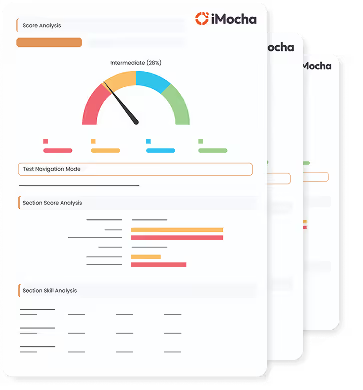


Choose easy, medium, or tricky questions from our skill libraries to assess candidates of different experience levels.
Choose easy, medium, or tricky questions from our skill libraries to assess candidates of different experience levels.

Choose easy, medium, or tricky questions from our skill libraries to assess candidates of different experience levels.

Choose easy, medium, or tricky questions from our skill libraries to assess candidates of different experience levels.
This a comprehensive PDF report, which you can instantly download and share with your hiring team or candidates for seamless collaboration.
Download Sample Report



Quantitative analyst test enables recruiters and hiring managers to hire job-fit candidates quickly and make unbiased decisions. This test helps hire graduates, senior managers, and accountants. Our online quantitative analyst test helps to reduce hiring costs by 40%.
.webp)




%20(1).webp)
Quantitative analysts use their knowledge of math and numerical operations to solve monetary or risk management problems. Quantitative analysts work with teams of mathematicians, engineers, and physicists to develop optimal systematic strategies for trading stock. They write programs, research, perform daily statistical analysis and solve problems to optimize trading strategies.
A quantitative analyst, or, in financial jargon, a quant, is a person who specializes in the application of mathematical and statistical methods – such as numerical or quantitative techniques – to financial and risk management problems. Similar work of industrial mathematics is done in most other modern industries, but the result is not always called quantitative analysis.
On the sell side, quantitative analysts help banks value their securities. On the buy side, they identify profitable investment opportunities and measure risk against reward. Outside of the banking world, a quantitative analyst might work for an insurance company helping to develop pricing models and risk evaluation strategies.
Some quantitative analysts, rather than crunching actual data to make investments or risk management decisions, work on the back end, developing computer software to evaluate financial data. These professionals almost invariably have advanced computer programming backgrounds in addition to mathematics and statistics.
Key Skills Required:

Quantitative analyst pre-employment test enables employers to identify and hire potential prospects by evaluating their working skills and job readiness. For this reason, emphasis is laid upon evaluating the knowledge of applied skills gained through real work experience rather than theoretical knowledge.
The test may contain MCQs (Multiple Choice Questions), MAQs (Multiple Answer Questions), Fill in the Blanks, Descriptive, Whiteboard Questions, Audio / Video Questions, AI-LogicBox, Job-based Simulations, True or False Questions, etc.
The Quantitative analyst skills test contains a combination of application and theory questions that help you evaluate candidates' practical skills.
A quantitative analyst test is designed considering EEOC guidelines. It will help employers to assess and hire diverse talent without any bias.







.webp)
.webp)
.webp)
.webp)